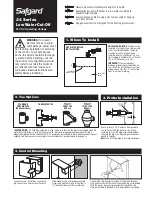
General Instructions
Typical Installation:
Vacuum Breaker
1. Vacuum breakers designed for
continuous pressure applications
will follow the AVB guidelines of
6”
or the PVB guideline of
12”
above
the flood rim. A typical installation is
shown below:
The valve consists of a modular
check and float assembly made of
engineered thermoplastic and
housed in a bronze body. The valve
is constructed with a molded
diaphragm separating the air inlet
from the potable water supply to
prevent spillage. Some slight
spillage may occur when water
outlet is above vacuum breaker or
when water is shut off abruptly.
Features:
Designed for indoor point of use
applications to prevent back-
siphonage of contaminated water into
the potable water supply. Separation
of the water supply from the air inlet
is accomplished by means of a
diaphragm seal. This protects against
spillage during start-up or operation.
* Modular cartridge for ease of service
* Vent uses an ‘O’-ring for reliable operations
* Bronze body for durability
* Compact space-saving design
* Standardly equipped with an ‘E-Z/TC’ Testcock
B-0963
vacuum
breaker
B-1403
H o s e
R e e l
Materials:
Springs - Stainless Steel
Bonnet - Noryl
Vent Disc - Silicone Rubber
Disc Holder - Noryl
Check Disc - Silicone Rubber
Body - Bronze
Pressure Temperature Ratings:
Working Temperature - 33º-180ºF
Max. pressure - 150 psi
Min. Pressure - 8 psi
End Connections:
Female NPT (National Pipe Threads) -
Ball Valve Shut-off
backplate
hose &
spray
B-0121
b a s e
faucet
B-1436
Reel
Kleen
Unit
Specifications:
A vacuum breaker should be in-
stalled according to manufacturer’s
instructions.


























